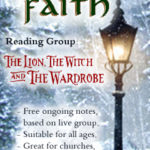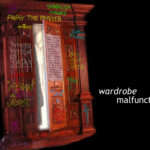What Makes Fantasy Work? Part 2
 Last time, I looked at the need fantasy has, if it is to work, for an engaging, believable character and for a world that is well-developed and consistent. An element of that world building, and one of the genre’s tropes, is magic. I’m using the term loosely here, not in the same way the Bible does. Hence “magic” is something other, something beyond the normal realm of realism. It can be a gift, a power, something supernatural. A good number of Christian fantasies don’t have traditional magic. But they do have something mysterious or beyond the normal physical realm.
Last time, I looked at the need fantasy has, if it is to work, for an engaging, believable character and for a world that is well-developed and consistent. An element of that world building, and one of the genre’s tropes, is magic. I’m using the term loosely here, not in the same way the Bible does. Hence “magic” is something other, something beyond the normal realm of realism. It can be a gift, a power, something supernatural. A good number of Christian fantasies don’t have traditional magic. But they do have something mysterious or beyond the normal physical realm.
In George Bryan Polivka’s Trophy Chase Trilogy, for example, the only “magical” element was the firefish–a mythical creature he created–and that was enough. It was both mysterious and other—not of this world.
I personally like more magic, not less. I wanted Gandalf to overcome the Balrog and the Hobbits to escape the Black Riders. I wanted the Ents to stir up the trees and the Elves to shield the Hobbits from the Orcs. I wanted the White Tree to provide Gondor with protection and Boromir’s horn to bring the help he needed. I wanted to warn Pippin not to look into the palantir.
The more magic, the more intrigue. Anything can happen, and the reader is left equally to wonder and to worry because the best stories give magic to both sides of the good versus evil equation.
Intrigue leads to the next point. Fantasy that works also has a plot that works. Rule one for a good plot: create conflict by giving your character something he wants or needs and must strive to acquire.
Like other fiction, fantasy is best when the character faces an external conflict and an internal conflict. Ideally the two battles will coalesce at the climax. That’s what J. R. R. Tolkien did so well in The Return of the King. Frodo wasn’t only fighting against Orcs and Sauron and Shelob. He was also fighting against becoming another Gollum.
Shockingly, the latter is the fight he lost. Which brings up another element that makes fantasy work—surprise. I think one of the reasons so much epic fantasy gets criticized is because of a lack of surprise. Readers and reviewers will say a story is “derivative” (the kiss of death to a fantasy) though you never hear that accusation made of romance or even of mystery. I have to believe that what the “derivative” accusers are actually saying is that the story tipped its hand and didn’t hold any surprise.
One of the things that kept me reading furiously through the last three Harry Potter books was the unpredictability. Was Snape good or evil? Would Harry be able to leave the Dursleys and go to live with Sirius Black? Would he win the Triwizard Tournament? Who was trying to kill him during the competition? Why was he seeing realistic visions of what Voldemort was doing? How would Harry find the horcruxes? And on and on.
Questions create intrigue, twists create surprise, and delay creates suspense. All of these elements, along with conflict, make a fantasy plot work.
Which brings us to the next element in fantasy that works: it says something important.
Our own Stephen Burnett had this to say about fantasy a number of years ago in his article “Defeating man-centered monsters with greater stories”:
I’ve read a few fantasy books whose authors are trying to Imitate Lewis. But there’s a catch: their Christ-figures, a la Aslan, aren’t much like Aslan, much less so the Biblical Christ. Sure, they have all the loving-humble-helpful parts, but few to none of the sovereign-holy-kill-his-enemies parts. And these Christ-equivalents exist, not with their own missions, but mainly as sidekicks for the real hero of the story, the Self-Doubtful Often-Angsty Gifted protagonist, who is on a Quest.
Stephen particularly addressed the issue of stories with a Christ figure. However, not every story written from a Christian worldview needs an allegorical Christ figure, in my opinion. But those that include one have set themselves a huge task.
 After all, C. S. Lewis created such a strong character that remained consistent with Christ’s nature, that any other may seem either derivative (there’s that dreaded word again!) or inadequate.
After all, C. S. Lewis created such a strong character that remained consistent with Christ’s nature, that any other may seem either derivative (there’s that dreaded word again!) or inadequate.
Does that mean we should shy away from showing Christ in Christian fantasy? No, I don’t think so. However, I believe that’s a high goal. If an author sets that high goal, rightly the reader must judge whether or not his story works by whether or not he successfully met the goal.
I tend to think that the problem Stephen mentioned in the quote above—that the Christ figure is a “side-kick”—occurs primarily because some authors back away from the high goal of putting Him meaningfully into a story as Lewis did with Aslan.
One secret here is that Lewis said he was not writing an allegory. Today, I think many Christian fantasy writers are writing an allegorical character, if not an allegory.
What was Lewis doing instead? He termed it “supposal.” In a world with fauns and talking animals and centaurs and dwarfs, Lewis asked, how would God show Himself?
Perhaps that’s the question we fantasy writers need to ask more often rather than forcing Christ-by-another-name into our stories.
But I said earlier that I don’t think stories have to have an allegorical Christ figure to still be Christian.
That doesn’t mean I think a story about not telling a lie or about forgiving our enemies is automatically Christian because it contains a moral value consistent with Christianity.
Rather, I believe—and this is quite subjective—stories that “till the soil” can be powerfully Christian. Such stories create the longing for the wholeness Christ gives, or for the acceptance His sacrifice made possible, or for the purpose His relationship frees us to achieve. I believe stories can show sacrificial love that is extraordinary and that will create a thirst for sacrificial love. I believe stories can show forgiveness that is pure and unmerited and it will create a thirst for similar mercy.
I could go on, but you get the idea. Instead of putting God into a story, I think it’s possible to put one of God’s characteristics in a story and show it so clearly that it becomes something that draws people, maybe even causes them to say, Wouldn’t it be great to know someone like that?
So what fantasies do you think work and why? Are there newer fantasies that have the elements we’ve looked at and which simply need to be discovered?
Of course, part of why I’m asking this is because I hope our readers here at Spec Faith are thinking about the Christian speculative novel–fantasy, science fiction, supernatural, or whatever–they would like to nominate for the Clive Staples Award. Let’s find the books that work and pick the best of the lot to honor.











































This article is just full of meat. Right now I’m brainstorming two possible future projects. One is decidedly fantasy, a genre that it new to me. Though Angel Eyes was often categorized as fantasy, I’m shooting for something that requires a whole new world (cue Aladdin).
I’m looking for craft books and articles and such that are full of meaty thoughts like this one. Throw your recommendations my way if you’ve got any.
I’m already planning to nominate Anne Elisabeth Stengl’s work for a C.S. Lewis award…some of the best new writing I’ve read in a while
Me, too! I love Tales of Goldstone Wood!! I also want to nominate R.J. Larson’s The Prophet.
Are there any awards of this type that are open to self-pubbed titles? My debut novel The Little Seer fits squarely in the Christian speculative supernatural genre, but it’s just closed doors for awards and traditional accolades, it seems, no matter who raves about it or how many thousands download it on Kindle.
… Proving again that no matter how popular a Thing proves to be, someone out there will have never heard of it! (Your title is unknown in the Speculative Faith Library, Laura; do feel free to submit the title with our Submit Novel feature.)
Here’s Becky’s answer from Reviving the Clive Staples Award:
Laura, I’d like to take a look at The Little Seer — is it available in the usual places?
Curiously enough, the first recent title this article brings to mind is scifi, not fantasy. Ashley Hodges Bazer’s Asylum was published by Westbow last year. She incorporated a strong church presence into her story without putting God on the page. Was He evident and necessary? Yes. But all of the interaction with Him was kind of second-hand. Which may not be how I might tell a story, but I think it opened some doors that would be closed in other cases. (It certainly gave me something to think about in terms of nonbelievers. Having grown up in a Bible reading, church-oriented environment, language and behavior falls into very clear categories. This story wasn’t told from a nonbeliever’s point of view, but it allowed me to see “The Church’s” behavior through fresh eyes.) The allegory was transparent, but the reader was left to make his/her own decisions about that.
As to the idea of writing invitingly instead of persuasively, I do wonder if speculative writers feel pressured to overcompensate when telling a story about redemption or grace. If-I-add-more-magic-then-I-need-double-Jesus-points kind of thinking. Telling a story about atonement or second chances doesn’t require faith in Christ, after all. Plenty of books tell excellent stories with easily drawn parallels, but are they deliberate? It is so tempting for a reader to make excuses for a work (“If I see something good in here, that’s close enough to Jesus”), that sometimes readers give a story more credit and less caution than it deserves.
By that same token, a Christ-oriented story doesn’t have to preach salvation. But to present characters who believe without introducing the One they believe in, this skates a very fine line. The choice to be introduced through the story should be the reader’s, I believe, but the choice should still be clear.
Good thoughts, Lex.
I saw this thinking with Avatar. I don’t know if writers try to overcompensate with the clarity of their Christian message because they use magic or are writing fantasy, but I know my initial feeling was, I didn’t want someone ascribing pagan meanings to my Christian work, so how else can you be sure unless you make it crystal clear?
I’ve since rethought that position, but I can understand how a writer might be tempted to think.
Becky
So does this mean you can vote for the nominations Stephen?
To Rebecca: The minimalist fantasy elements would be a mark of “low fantasy”. I think that term would describe it, except for the “high fantasy” elements. I have actually labeled books as being BOTH high fantasy and low fantasy at the same time.
Aren’t we as readers partly to blame for the misunderstanding that “derivative” is bad. “Derivative” has to do with using ideas that were first used by others. There is some similarity there. If something is too much where it copies another work, then that might be bad. Sometimes, this isn’t horrible, as sometimes this is purposeful, like “x” title with a twist. But often, the use of similar ideas to Lewis or Tolkien is treated as a horror. We treat it that way, so we are to blame for this misconception that any similar ideas somehow “equals” plagiarism.
It’s not so much about plagiarism, but tiredness. Epic fantasy, especially Christian fantasy in a Lewis/Tolkien mode, is almost as played out as Amish fiction or YA paranormal. The horror at being derivative comes from this.
Even the choice of authors: I would buy in a heartbeat a Christian author who says their work is inspired by Tanith Lee, Lovecraft, Stephen Donaldson, or even Mercedes Lackey if just because it shows their contact with fantasy is more than just the sacred duo there. There’s way too many Narnia or Middle Earth pastiches.
Great articles as always. Does anyone know of a fantasy critique group? I’m busy writing ‘The Chronicles of Orm’ and would like some critique and also like a chance to see other work in progress. Keep up the good work here. Keep the fantasy alive.
Just a couple of weeks ago a speaker at our church told of a lady he met who had watched/read the Narnia stories (not sure which), was very impressed by Aslan’s character, and said, “I wish I could meet someone like that”…
I’m not really sure about surprises. Some of the better series that have used them have realized you can’t do big surprises: Harry, Hermione, and Ron will live to the end, and they won’t really be much changed, for example. A lot of the danger is not because it’s really dangerous, but because we expect it. It’s only a gutsy author who might kill Harry Potter, even if just to resurrect him in the end.
What they use are small surprises. I’m currently watching Little Busters, and they do it in such a hilarious way that it never fails to make me laugh. They have a small surprise often in that the resident lunkhead is always challenging someone to fight. However, in order to prevent serious property damage, the condition of the battles is that they have to fight using whatever someone throws at them. Currently he’s fought battles using a nail clipper, a bar of soap, a small cat, and a piece of bread. It’s a surprise that’s impossible to predict, and it avoids the whole “Oh yeah, sure Harry’s going to get killed by Voldemort, right.”
I think too many books try to go for a big surprise, but come on. It’s Jesus. We know how the stories end. If the guy in your book is old, has a beard, and is wise, I’m giving 70% odds he will pull a Gandalf. An atheist in your book? He’s a bad guy and a scientist. If you go big, go big and wild.
Amen! While storytelling tropes themselves are neither good nor bad, writers seem often to forget that at least half their usefulness stems from their power to lead readers down false trails. If you know for a fact that your audience expects your Token Ancient Bearded Guy in a Funny Hat to fulfill the Mentor archetype, then it’ll be easy to pull a fast one on practically everybody by turning him into something else entirely.
Fantasy is a genre that’s stagnated over the past several decades. The fact that it’s impossible to out-Tolkien Tolkien or out-Lewis Lewis hasn’t impeded the seemingly endless quest to do just that. But this situation, rather than giving me unease, makes me excited. It’s quite fun to be writing fantasy at a time like this, when the element of surprise is a low-hanging fruit.